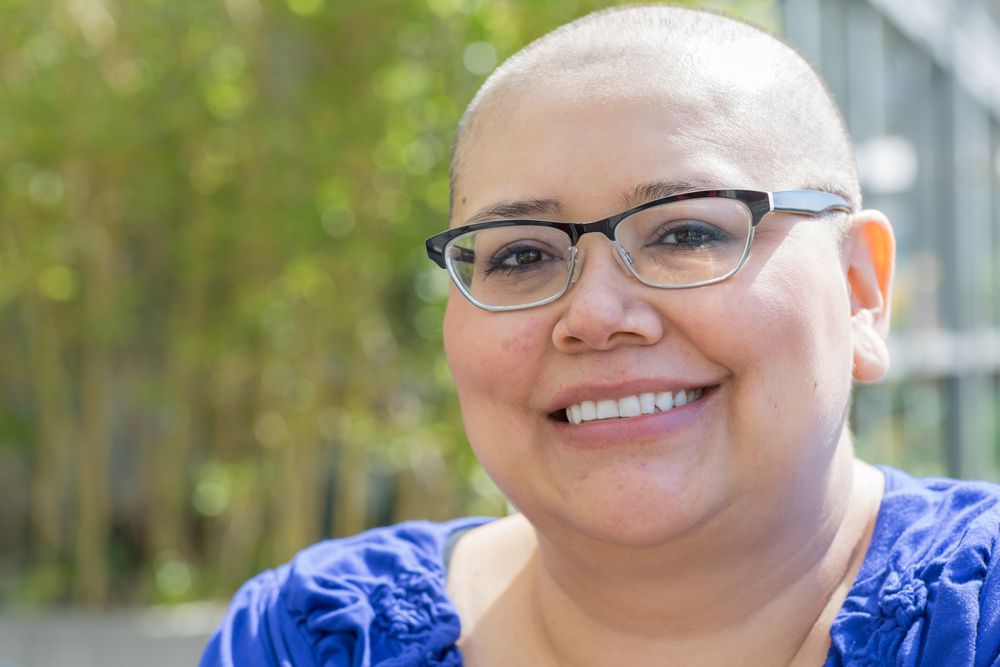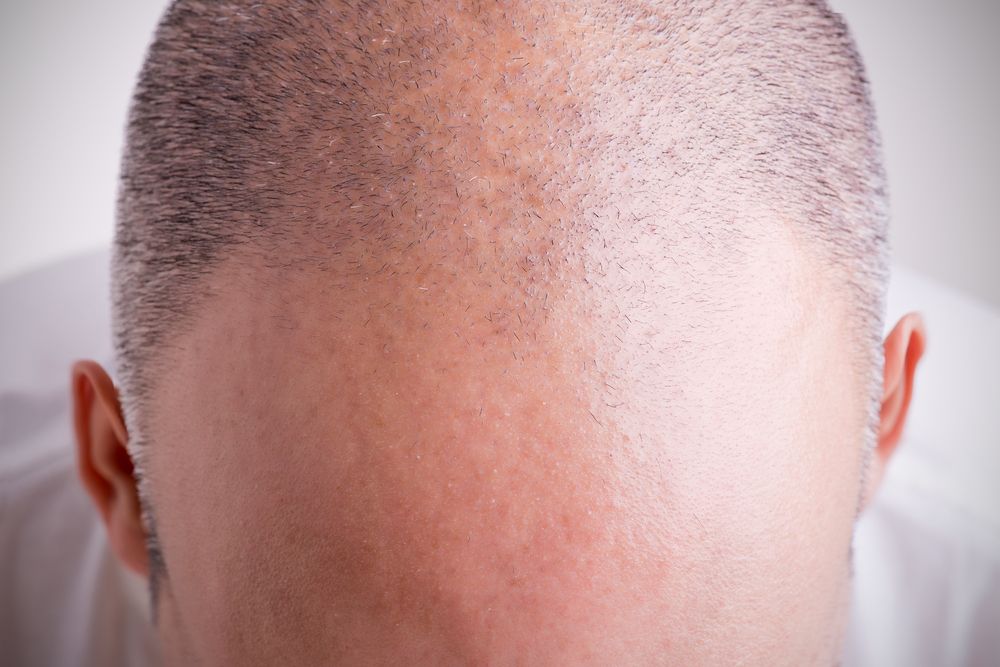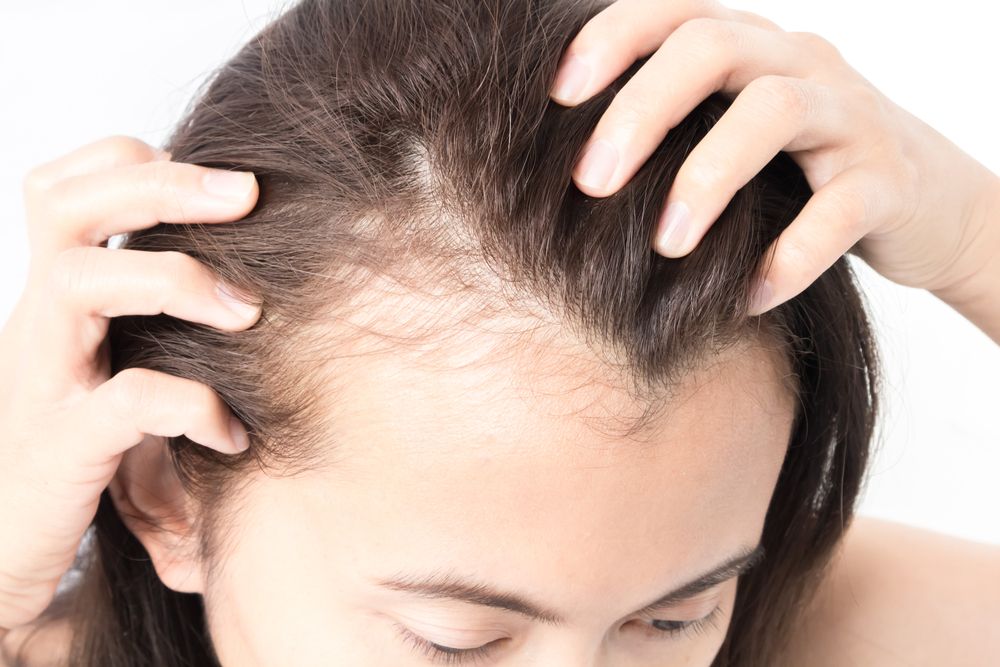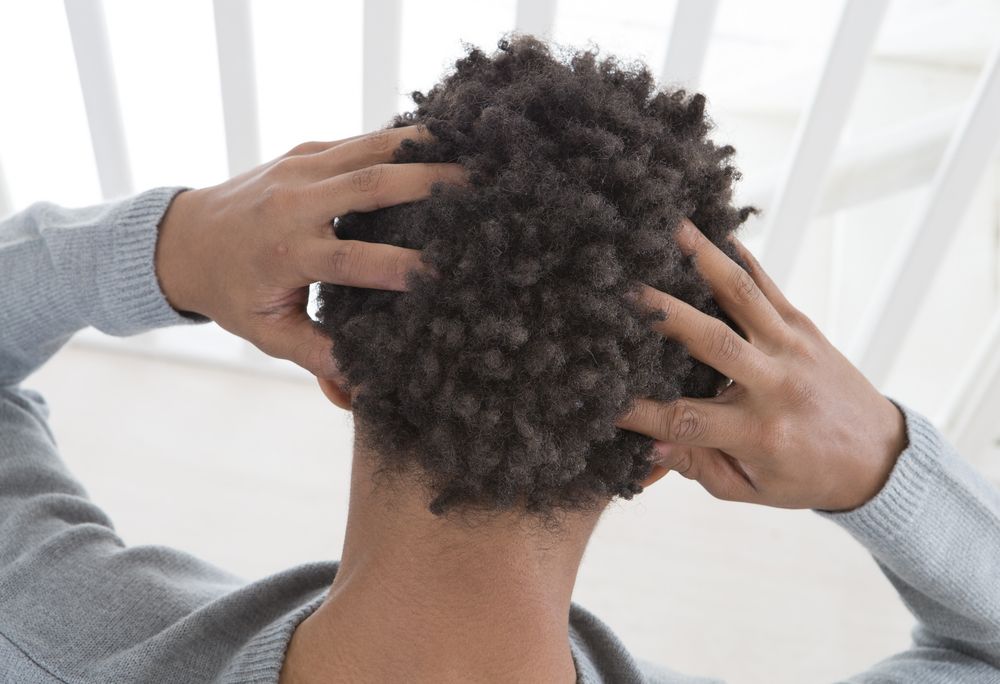Understanding the Causes of Hair Loss
 There are multiple possible causes of hair loss, so by first determining the reason for your hair loss, our doctors can design a restoration plan for you. Drs. Robert H. True and Robert J. Dorin, serving Manhattan, NYC, and communities throughout greater NYC, have placed the causes into generally accepted categories for ease of understanding. However, this information is not all-inclusive and should not be considered a substitute for consulting with a physician.
There are multiple possible causes of hair loss, so by first determining the reason for your hair loss, our doctors can design a restoration plan for you. Drs. Robert H. True and Robert J. Dorin, serving Manhattan, NYC, and communities throughout greater NYC, have placed the causes into generally accepted categories for ease of understanding. However, this information is not all-inclusive and should not be considered a substitute for consulting with a physician.
What is Hair Loss?
Hair loss, or alopecia, refers to any one of a number of conditions characterized by the loss of hair from the scalp or entire body. Hair loss can affect men, women, and children - although the timing and the appearance vary depending on the cause of the condition.
Most Common Types of Hair Loss
The most common type of hair loss is male and female pattern baldness, excessive hair loss from the scalp caused by a genetic disorder which affects about 30 million American women and nearly 50 million American men. But a growing number of men and women are undergoing surgery for hair loss, thanks to improvements in surgical hair transplantation.
Signs of Hair Loss
Hair sheds naturally -- most people lose around 100 hairs from their head every day. However, some people experience excessive hair loss. Signs and symptoms caused by hair loss will vary depending on what type of condition the person has. Some general signs and symptoms associated with, but not specific to, hair loss include:
- Slow but steady hair loss on top of the head. The most common form of the condition plagues both men and women, but each gender experiences different signs of gradual thinning of hair on the top of the head. Women usually notice a widening of a part in their hair, while men notice a gradual thinning of the hair from the forehead.
- Round patches of thin or bald areas. This type of hair loss looks like round, hairless patches on the scalp that typically starts with one or two patches and can develop into complete baldness.
- Rapid hair loss. Stress affects every person differently. Extreme stress, trauma, or shock to the body or emotions can result in a sudden loss of hair. You might notice bundles of hair coming out while you're in the shower or when you brush your hair.
An Overview of Hair Loss Causes: Alopecia 101
 In general, hair loss, clinically termed alopecia, can be categorized into two major categories: scarring alopecia and nonscarring alopecia.
In general, hair loss, clinically termed alopecia, can be categorized into two major categories: scarring alopecia and nonscarring alopecia.
- With scarring alopecia, the skin displays evidence of inflammation, fibrosis, and associated damage or loss of the surrounding follicles.
- In nonscarring alopecia, the follicles are intact and the skin does not show evidence of inflammation or fibrosis, but there is still hair loss.
Both scarring and nonscarring alopecia can be sub-divided into primary cutaneous (skin) disorders and systemic diseases. Drugs can also cause nonscarring hair loss, usually by induction of a telogen effluvium (see chart below). Primary cutaneous (skin) disorders are the most common causes of both nonscarring and scarring alopecia. Our doctors encourage patients to ask questions about hair loss causes at our facilities serving Manhattan and communities throughout greater NYC.
Nonscarring Alopecia
|
I |
Primary Skin Disorders | |
| Androgenetic Alopecia- | Male and female pattern baldness | |
| Telogen Effluvium- | Hair loss after pregnancy and childbirth, high fever, rapid weight loss (naturally or after bariatric surgery) and drugs. | |
| Tinea capitis- | Fungal infection of the scalp | |
| Traumatic Alopecia- | Traction alopecia from constant tight braiding, overstyling, chemical relaxors, etc. | |
| Alopecia Areata- | Usually patchy, sometimes diffuse totally bald area |
|
II |
Drugs that may cause hair loss | ||
| Amphetamine | Isotretinoin | Amiodarone | |
| Lithium | Anabolic Steroids | Sulfasalazine | |
| Allopurinol | Salicylates | Colchicine | |
| Tricyclics | Beta Blockers | Oral Contraceptives | |
| Captopril | Isoniazid | Bromocriptine | |
| Interferon | Chemotherapeutic | Drugs | |
| Cimetidine | Heparin | Corticosteroids | |
| Warfarin | Gentamicin | Carbimazole | |
| Immunoglobin | Acetretin | Iatraconazole | |
| Propylthiouracil | Levodopa | Vitamin A | |
| Nitrofurantoin | Nicotinic Acid | Terfenadine | |
|
III |
Systemic diseases that can cause hair loss | |
| Hypothyroidism | HIV infection | |
| Hyperthyroidism | Systemic Lupus Erythematosis | |
| Hypopituitarism | Secondary Syphilis | |
| Deficiency of Vitamin B, Protein, Biotin, Iron, Zinc | ||
| IV | Trichotillomania- | An obsessive compulsive disorder causing self-inflicted hair pulling resulting in hair loss. |
Scarring Alopecia
|
I |
Primary Skin Disorders |
| Lichen Planus | |
| Cutaneous Lupus | |
| Folliculitis Decalvans | |
| Morphea | |
| Traumatic Alopecia- chemical burns | |
| Idiopathic Pseudopelade of Brocq |
|
II |
Systemic diseases leading to hair loss |
| Lupus Erythematosus | |
| Sarcoidosis | |
| Skin Metastases |
Other Forms of Hair Loss Causes
By far, the most common of the many hair loss causes treated at TRUE & DORIN Medical is androgenetic alopecia. However, some of the other forms of alopecia can be successfully treated once the medical condition has been corrected or controlled or if the underlying issue has stabilized on its own.
Androgenetic Alopecia
Also known as hereditary balding, androgenic baldness, male pattern hair loss, and female pattern hair loss (see classification charts below). Occurring in both men and women, this type of alopecia is progressive and results from a sensitivity of the follicles to androgens (DHT) among those who are genetically predisposed. While the age of onset and degree of balding vary, the patterns tend to be somewhat predictable.
Traumatic Alopecia
Especially affects women, and usually African-American women. Generally resulting in hair loss around the periphery of the scalp, traumatic alopecia is caused by the use of cosmetic treatments to the hair, and in particular the overuse of hair straightening tools, hair dyes, and hair permanents. In addition, constant tension on the hair follicles due to tight braiding (for example, ”corn-row” braiding) or the use of hair extensions, can lead to traction alopecia.


What Treatment is Right for Me?
Many hair loss treatments are available, including medication, surgery, and non-surgical options such as wigs and hairpieces. Your treatment options will depend on several factors, including type and stage of your hair loss, cost, and your general preferences. Together you and your doctor can discuss the advantages and disadvantages of each treatment to determine which is best for you.
However, surgery is one of the most common solutions to hair loss. At the TRUE & DORIN hair loss clinic, we specialize in ultra-refined follicular unit transplantation (FUT) and follicular unit extraction (FUE). Our natural-looking hair loss procedures are customized to your individual needs and goals.
Learn More about Hair Loss Causes
Dr. True and Dr. Dorin are experts in hair loss and its various causes. Manhattan and greater NYC residents who would like further information or to schedule a consultation are invited to contact our hair loss practice today!
Hair Loss Resources and Information
Our practice, headquartered in Manhattan, NYC, invites you to explore these resources:
Medical Professional Organizations
 International Society of Hair Restoration Surgery (ISHRS) is a non-profit educational organization that provides information on hair loss and its treatment. It is the largest professional medical society in the world, devoted to the advancement of hair restoration surgery. Visit the web site to find member physicians and a wealth of reliable information on hair loss and hair restoration surgery: www.ishrs.org
International Society of Hair Restoration Surgery (ISHRS) is a non-profit educational organization that provides information on hair loss and its treatment. It is the largest professional medical society in the world, devoted to the advancement of hair restoration surgery. Visit the web site to find member physicians and a wealth of reliable information on hair loss and hair restoration surgery: www.ishrs.org
American Board of Hair Restoration Surgery (ABHRS) To qualify for certification, doctors must demonstrate extensive training and experience in hair restoration surgery. Then they must pass both written and oral examinations and participate in ongoing continuing education and practice performance assessment. To learn more about board certification and the member doctors of the American Board of Hair Restoration Surgery, visit their web site: www.abhrs.com
International Alliance of Hair Restoration Surgeons (IAHRS) is a consumer organization that selectively screens skilled and ethical hair transplant surgeons around the world. The IAHRS is endorsed by Consumer Reports as well as WebMD. Visit this website for more info: www.iahrs.org/
Social Media
Facebook – Access our blogs, video, photos, and become part of the True & Dorin community! Join us on Facebook.
YouTube - Browse our videos, discussing the latest in hair transplant surgery and showcasing the amazing results that can be achieved by True & Dorin, on Vimeo.
Twitter - Get the latest scoop from True & Dorin. Follow the doctors to find out what’s going on in the world of hair restoration at http://twitter.com/TrueDorinHair.
Service Organizations
The National Alopecia Areata Foundation (NAFF) supports research to find a cure or acceptable treatment for alopecia areata, supports those with the disease, and educates the public about alopecia areata. NAAF is governed by a volunteer Board of Directors and a prestigious Scientific Advisory Council. Founded in 1981, NAAF is widely regarded as the largest, most influential, and most representative foundation associated with alopecia areata. For further information, please visit www.naaf.org.
Cicatricial Alopecia Research Foundation (CARF) was formed as a result of one person's experience with scarring alopecia (cicatricial means scarring). When the patient realized that little is known about such disorders, she decided, with the help of her doctor, to initiate a grassroots effort to raise funds to study these problems. Visit this website to find pertinent information about the cicatricial alopecias: www.carfintl.org.
American Hair Loss Association (AHLA) is the nation’s foremost 501(c) 3 non-profit charity committed to educating and improving the lives of all those affected by hair loss. The AHLA endeavors to create public awareness of this devastating disease of the spirit, and to legitimize hair loss of all forms in the eyes of our medical community, the media, and society as a whole: www.americanhairloss.org.
Medical Advice
Mayo Clinic - You can always find thorough and up-to-date medical information, including detailed information about hair loss, on the website of one of the world’s greatest medical centers: www.mayoclinic.com/health/hair-loss/DS00278.
Web MD is a great resource for current medical information, including in-depth information on hair loss causes and treatment options: www.webmd.com/skin-problems-and-treatments/hair-loss/default.htm.
National Library of Medicine (NLM), on the campus of the National Institutes of Health in Bethesda, Maryland, is the world's largest medical library. The library collects materials and provides information and research services in all areas of biomedicine and health care: http://www.nlm.nih.gov/.
Hair Loss Products
ROGAINE® foam is the only topical brand approved by the FDA to regrow hair in both men and women. With more than 20 years of results and over 20,000 people in clinical trials, ROGAINE® is the number-one dermatologist-recommended brand for hair regrowth. ROGAINE® helps reverse the progression of hereditary hair loss. Please visit www.rogaine.com.
Propecia® is the only FDA-approved prescription drug for treatment of male balding. The effectiveness of Propecia® lies in its ability to significantly reduce DHT, a key cause of hair loss, by inhibiting the formation of DHT in the scalp. To learn more about how Propecia® works and whether it could help you, visit www.propecia.com.
DermMatch® colors the scalp to match your hair color. It also coats and thickens thin hairs, making them stand up and spread out for maximum fullness. No product in the world can make your hair look this thick and full. DermMatch® works instantly for men and women of any skin color, hair color, or hair type: www.dermmatch.com.
Toppik® Hair-Building Fibers instantly fill in balding or thinning areas. Made of pure organic protein, Toppik® is completely undetectable and resistant to wind, rain, and perspiration, yet it easily washes out with shampoo: http://www.toppik.com/shop#hair-building-fibers
Understanding the Relationship Between Stress and Hair Loss
Stress and anxiety are serious factors that can lead to illness, health complications, and hair loss. Stress and hair loss affects millions of people, causing some to literally pull out their hair, and others to experience increased thinning and bald spots. If you have experienced hair loss as a result of a difficult life experience or a period of increased anxiety, Dr. Robert J. Dorin and Dr. Robert H. True at True & Dorin Medical Group can help you grow a fuller, thicker head of hair. We have offices in Manhattan, NYC, and communities throughout greater NYC.

Why Stress Causes Hair to Fall Out
The natural growth of hair occurs in various stages, comprised of anagen, categen, telogen, and then the final stage in which the hair falls out, exogen. This natural process leads to the loss of about 50 to 100 hairs each day but when patients experience high levels of stress, this entire process may become disrupted. Increased levels of stress can cause the hairs to prematurely move into a resting phase, which will then cause hair to fall out at a rate that is up to 10 times greater than normal. Although stress is not typically the sole contributor to hair loss, studies have suggested that neurotransmitters or hormones produced during this time may contribute to more rapid hair loss.
Prolonged levels of stress or serious life changes can cause hair to fall out at a rate that is up to 10 times greater than normal.
Conditions That Can Lead to Hair Loss
Stress can contribute to or result from various conditions that lead to increased shedding or hair pulling. Some of the most common issues include:
Alopecia Areata
Many researchers are interested in whether there is a credible link between stress and alopecia. Although additional tests are still being conducted to determine a verifiable connection, many patients have reported they believe stress can lead to thinning and bald spots.
Telogen Effluvium
Emotional stressors caused by difficult life experiences such as sudden shock, trauma, divorce, or the death of a family member can have a significant impact on your emotional health. In turn, this can lead the development of telogen effluvium, causing hair loss and the development of bald spots.
Trichotillomania
Also referred to as hair-pulling disorder, this behavior is sometimes triggered following a stressful life event. Other times, it is indicative of a more serious condition.
Reducing Stress and Restoring Your Appearance
If you are concerned about how stress is affecting you, whether it be your overall health or the fullness of your hair, various steps can be taken. Five common activities that have been shown to lower levels of anxiety include:
- Meditation
- Talk to family and friends
- Laughter
- Listen to music
- Stay active
It is important to note that it is not uncommon for patients to experience hair loss weeks or even months following a tragic or emotional period in their lives. This is due to the fact that there is a substantial delay between the catagen and telogen phases. Most patients see a return in fullness once they have reduced stress levels. However, we can provide several treatment options if you are not confident in your appearance.
Contact Us to Learn About Your Options
If you have experienced a stressful period or a life-changing event that led to hair loss, our doctors can meet with you to discuss your options for hair restoration and transplantation. To set up a time to meet with us, please send us a message or give us a call at (516) 214-6776.
Successfully Treating Traumatic Alopecia
Hair loss caused by injury to the scalp, such as overheating during styling, is known as traumatic alopecia. Unlike other types of hair loss, this condition is caused by behavioral factors. Therefore, it is completely in your control to stop and prevent hair loss in the future. At True and Dorin Medical Group, we are dedicated to helping patients in greater Manhattan, NYC, achieve a natural-looking, full head of hair and can help you develop a plan to properly manage your condition. While traumatic alopecia cannot be prevented using medication, the hair may be restored through one of our other treatment options. Dr. Robert H. True and Dr. Robert J. Dorin can perform innovative hair restoration procedures that provide remarkable results.

What is Traumatic Alopecia?
Traumatic alopecia, or traction alopecia, is categorized as a non-scarring condition. This form of alopecia is characterized by hair loss that occurs without symptoms found on the skin such as inflammation or fibrosis.
What Causes Traction Alopecia?
Traumatic alopecia is unique compared to other hair loss conditions as it is caused directly by the patient. The condition often develops as a result of prolonged tension on the hair, which can lead to inflamed follicles or hair that has completely detached from the root. This tension is commonly caused by:
- Chemical straightening treatments
- Tight hairstyles such as braiding or ponytails
- Hairpieces and weaves that rely on the hair for security
- Tight rollers
- Headgear such as helmets
Since cosmetic treatments and styling techniques that cause tension are more commonly used by women, it is not commonly a cause of male hair loss. Patients who suffer from trichotillomania, an emotional condition that drives compulsive pulling, twisting, or plucking of the hair, may also develop traumatic alopecia.
Symptoms and Indicators
Common warning signs that you may be causing excessive tension and damage to your hair follicles can include:
- A scalp that is sensitive to the touch when you take your hair down
- Itchy scalp when wearing braids or a weave
- The need for painkillers for a headache caused by a tight hairstyle
As damage escalates, hair will begin to fall out or become sparse. Typically, this will happen more quickly around the hairline or behind the ears. However, depending on your habits, it can also occur at the crown of the scalp.
Preventing Further Damage
Traumatic alopecia can be prevented by actively avoiding certain hair styling techniques or lifestyle habits. If you are committed to preventing the effects of traumatic alopecia, you can stop hair loss and in some cases, restore your hair naturally. However, if your hair follicles have been irreversibly damaged, professional intervention will be necessary.
We are dedicated to helping our patients achieve a natural-looking, full head of hair and can help you develop a plan to properly manage your condition.
Professional Hair Restoration
Our doctors can provide innovative treatment to restore your full head of hair. We offer a variety of surgical solutions for hair loss. A consultation will allow us to evaluate your condition and determine your best treatment options. Your doctor will also provide you with all the details you will need to make an informed decision, including the risks and cost associated with treatment. We are committed to helping our patients make a positive change in their lives that will not only restore their hair but also their self-confidence.
Individualized Treatment with True and Dorin
Dr. True and Dr. Dorin have dedicated their careers to helping patients suffering from traumatic alopecia. Their unique approach focuses on individualized treatment that focuses on the qualities of your hair and condition to determine the best procedure for you. Contact us online or call us at (516) 214-6776 to begin your treatment plan.
Advanced Treatment for Hair Loss After Chemo
Unfortunately, hair loss after chemo is a common side effect of these powerful drugs. For many patients, hair growth can resume shortly after their cancer treatment. However, for others, permanent baldness or changes in hair growth may be permanent. Dr. Robert J. Dorin and Dr. Robert H. True can help you determine the best approach to reestablishing the hair that you have lost. True and Dorin Medical Group, with offices serving Manhattan, NYC, and communities throughout greater NYC, is one of the leading hair restoration clinics. We attribute this distinction to our exceptional care, outstanding services, and individualized treatments that often exceed the expectations of many of our patients.

What Causes Hair Loss After Chemotherapy?
The medication used to effectively attack cancer-causing cells can also attack other rapidly dividing cells, including those that contribute to hair growth. This rapid hair loss is referred to as anagen effluvium and can affect hair on your head, as well as virtually any other part of the body. The degree to which hair loss occurs depends mainly on the unique composition of the prescription and the duration of treatment. Drugs associated with chemo that commonly cause hair loss include:
- Adriamycin
- Cyclophosphamide
- Dactinomycin
- Daunorubicin
- Docetaxel
- Doxorubicin
- Etoposide
- Fluorouracil
- Ifosfamide
- Irinotecan
- Methotrexate
- Nitrosureas
- Paclitaxel
- Tamoxifen
- Topotecan
- Vinorelbine
In cases when radiation must also be applied to the head, hair will often fall out and for many patients will not grow back.
Preparing for Hair Loss
Developing a plan ahead of time for before, during, and after chemotherapy can provide you with peace of mind and the ability to actively change the way hair loss affects you. While there is no proven method that can completely prevent this side effect, our doctors can help you better prepare. For those who wish to conceal their hair loss or maintain a hairstyle that looks natural, we provide several resources that can help patients find a lifelike wig or hairpiece that suits them.
What to Expect During and After Chemo
Generally, hair will begin to fall out several weeks into treatment or later. Once hair loss has begun, patients can expect the condition to persist for the duration of chemotherapy. The extent of hair loss will vary from patient to patient and may range from minimal thinning to complete baldness.
We understand the challenges our patients have faced and their desire to regain control of their appearance.
Once treatment has ended, hair loss should cease a few weeks after. Hair may grow back in a different color or texture than before but will often revert to its normal state after a few years. For those patients who do not experience substantial regrowth or experience complete baldness after their chemotherapy has ended, our team can help you determine the best restoration options.
Hair Restoration Treatment Options
True and Dorin Medical Group has helped many patients reestablish their hair growth after chemotherapy. We understand the challenges our patients have faced and their desire to regain control of their appearance. Our doctors can conduct a thorough evaluation where they will evaluate the stage of your regrowth and the damage that has been imposed on the hair cells. We offer surgical, non-surgical, and medicinal options, and often combine treatments to achieve optimal results.
Experience Personalized Care
Dr. True and Dr. Dorin want to help you plan and customize your hair restoration treatment to combat hair loss caused by your chemotherapy. Our medical team is invested in creating a positive experience for each and every patient. Contact us online or call us at (516) 214-6776 to learn more about the True and Dorin Medical Group experience.
Protein Deficiency and Hair Loss
Each and every cell in the body requires protein. One of the many important functions of protein is to aid in hair growth. When there is an insufficient amount in the body, the growth cycle may be altered to ensure that other vital functions continue. This can lead to dry, brittle hair and eventual thinning. For over 30 years, patients in Manhattan, NYC, and communities throughout greater NYC have been receiving life-changing hair restoration services from the doctors at True & Dorin Medical Group. Dr. Robert H. True and Dr. Robert J. Dorin have helped many patients identify protein deficiency and hair loss, as well as achieve successful hair regrowth through compassionate, individualized care.
How are Protein Deficiency and Hair Loss Related?
Keratin is a protein that is crucial to the health of your hair follicles. This protein strengthens your hair and provides elasticity, which prevents breakage. When there is an insufficient amount of protein in your body this process cannot occur, which means a much higher number of your hair follicles entering the resting phase at the same time. The end result is often noticeable hair loss.
Our doctors have helped many patients identify protein deficiency and achieve successful hair regrowth through compassionate, individualized care.
There are several groups of individuals who are more susceptible to protein deficiencies related to their dietary choices:
- Vegetarians and vegans
- Bariatric surgery patients
- Those who are dieting
In addition, patients suffering from hypothyroidism may also struggle with insufficient protein levels.

Methods of Prevention
Protein-rich foods can help you maintain a healthy level of this nutrient within your body. This is turn will allow you to produce more keratin. A balanced diet should include:
- Red meat or chicken
- Fish
- Dairy products
- Beans
- Kale
- Asparagus
These foods are high in protein, sulfur-rich amino acids, and biotin. Some patients may find natural hair supplements helpful as well.
Restoring Hair Growth
If you are able to stabilize your protein intake but do not see a substantial decrease in hair loss, you may have a genetic hair loss condition. In this case, hair loss will persist until treated. At True & Dorin Medical Group, we can help slow hair loss and reestablish growth through a variety of both surgical and non-surgical treatments.
- Platelet-Rich Plasma (PRP) Therapy: This advanced procedure can reverse the effects of hair loss using the platelet-rich plasma in your own blood. It is safely injected into the scalp to encourage new cell growth.
- Follicular Unit Transplantation (FUT): Dr. True and Dr. Dorin can safely perform this procedure, which harvests hair from a donor area and transplants it into the thinning or balding areas.
- Follicular Unit Extraction (FUE): Similar to FUT, hair is grafted from the donor area, however, it is a much less invasive procedure. This precise technique results in minimal scarring.
While these procedures are popular for patients suffering from hair loss caused by protein deficiency, we offer many other treatments that can be tailored to your needs.
Experience Unparalleled Care
Our doctors understand the stress and discomfort many hair restoration patients experience and strive to provide discreet treatment that will help you manage your condition. If you are experiencing prolonged hair loss, contact us online or call us at (516) 214-6776 to schedule a consultation.
Hair Loss Caused by Overstyling
At True & Dorin Medical Group, our doctors often treat patients who have suffered hair loss caused by overstyling. Overstyling can involve using the wrong styling tools, or the overuse of certain hair products. This can cause significant damage to a patient's hair and hair follicles, resulting in brittle, frizzy, and weakened hair that falls out more easily. Drs. Robert True and Robert Dorin offer several different treatment options to help patients from Manhattan, NYC, and communities throughout greater NYC restore their hairlines after experiencing hair loss caused by overstyling.
Styling Mistakes to Avoid
Many patients are aware that using harsh chemicals on their scalp can affect hair growth, but few understand some of the more common mistakes that can be made when caring for their hair.

Towel Drying
Drying your hair roughly with a towel can cause extensive damage to the cuticles, which are the outer layer of each strand of hair. When your hair is wet, it swells, leaving it vulnerable to damage when it comes into contact with a towel. Our doctors advise patients to allow their hair to air dry before using a towel.
Aggressive Brushing
Using a brush or a comb aggressively can damage the hair strand itself in addition to the cuticle and follicle. While it may be impossible to completely avoid pulling out strands of hair when brushing, if you are noticing an excessive amount of hair in your comb, it may be a sign that you are brushing too hard.
Using the wrong types of hair products containing harmful ingredients may be damaging your hair.
Ultraviolet Light
Most of us understand how harmful prolonged sun exposure can be for your skin, but few attempt to take the same protective measures for their hair. Ultraviolet (UV) light can damage the connective structures within each hair strand, weakening the hair and allowing it to fall out more easily. Our doctors recommend that patients use products that contain sun protection, wear hats, or use hydrating shampoos to restore lost moisture.
Harmful Styling Products
We understand that most men and women use some type of product in their hair, but using the wrong types containing harmful ingredients may be causing additional damage. Certain types of soap can dry out hair and cause more shedding. Some preservatives that are commonly found in hair products, such as parabens and formaldehyde, can affect your body's hormonal balance, which can also contribute to hair loss.
Styling Tools
While many styling tools are safe and effective, extensive use of heat or other tools may be harmful to the structure of your hair. Our doctors recommend that patients exercise caution when determining which tools to use, and how often they are using them on their hair.
Schedule a Consultation
At True & Dorin Medical Group, our doctors specialize in finding unique hair restoration solutions for each patient. If you have experienced hair loss that may have been caused by overstyling, certain hair products, or styling tools, please contact us through our website or call (516) 214-6776. We can determine a way to help you restore your hair and your confidence.
Hereditary Hair Loss Causes and Treatment Options
Hereditary pattern baldness is the most common form of hair loss. Nearly every man and woman will notice hair loss or hair thinning as they age, but this condition is much more noticeable, and affects almost 40 percent of the population. At True & Dorin Medical Group, we frequently see patients at our offices in Manhattan, NYC, and greater NYC who are affected by hereditary hair loss and we offer advanced treatment solutions. Drs. Robert True and Robert Dorin can perform a thorough evaluation of your scalp to determine the cause of your hair loss and help you find an appropriate treatment.

What is Hereditary Hair Loss?
Hereditary hair loss is a natural condition that is caused by a combination of hormone levels, age, and genetics. Also called androgenic alopecia or male pattern baldness in men, this condition typically begins when the patient is in his or her 20s or 30s and progresses with age.
Researchers believe that certain hormones may influence hair growth in patients with hereditary pattern baldness. Testosterone and other androgens can disrupt the normal growth cycle of hair, resulting in shorter, thinner hair that is eventually lost. This type of hair loss is generally permanent. However, there are several treatments that have shown satisfying results for patients.
Our compassionate specialists are ready to help you achieve your goals and experience new levels of confidence.
Treatment Options for Hereditary Hair Loss
True & Dorin Medical Group offers several treatment options to help patients restore their hairlines. During a through consultation, one of our doctors can identify the cause of your hair loss and recommend the best treatment for your unique needs. All of our procedures are customized for each patient, taking your specific goals into consideration.
Follicular Unit Transplantation
Follicular unit transplantation (FUT) is a procedure that involves removing a strip of skin from the back of the head and harvesting individual follicular units from the strip to be transplanted into the treatment area. The surrounding hair at the back of the scalp will easily conceal any scars left after the excision.
Follicular Unit Extraction
Follicular unit extraction (FUE) is similar to FUT, except that this treatment does not require a strip of skin to be removed. In this procedure, follicular units are harvested directly from the donor area (usually at the back of the head) and prepared to be transplanted into the treatment area.
Other Options
Our practice is at the forefront of hair restoration and has recently been exploring stem cell therapy for hair loss. In this treatment, the patient's own stem cells are harvested by isolating them from fat cells that are removed through liposuction. These stem cells are then injected into the scalp, which can result in new hair growth. This is still a relatively new procedure, so patients may require more than one treatment to achieve the results that they desire. We also provide several other surgical and nonsurgical solutions to accommodate a range of needs.
Schedule a Consultation
If you have noticed thinning hair and would like to learn more about our treatment options, please contact us through this website or by calling (516) 214-6776 to schedule a consultation with one of our doctors. Our compassionate specialists are ready to help you achieve your goals and experience new levels of confidence.
Understanding the Relationship Between Iron Deficiency Anemia and Hair Loss
In order to maintain thick, healthy hair, your body requires a collection of vitamins, nutrients, and minerals. When some of these essential elements are lacking, your hair may enter a resting phase and eventually thin and fall out. If you would like to restore your appearance and confidence, Dr. Robert H. True and Dr. Robert J. Dorin of True & Dorin Medical Group can assist you at one of their locations in Manhattan, NYC, and communities throughout greater NYC.

One of the most important minerals which helps promote strong, healthy hair is iron. If you are struggling with anemia and iron deficiency, you may notice that your hair does not have the same fullness and thickness as it once had. Iron deficiency anemia and hair loss can be frustrating but it is generally treatable. Once we determine the cause of your condition, we can personally tailor treatment for the most lasting, natural-looking results.
How Ferritin Affects Hair Growth
Ferritin is a blood cell protein which contains iron and assists in the production of hair cells. When your body is not receiving proper levels of iron, the stored proteins will be transferred from non-essential areas, such as hair bulbs, to essential tissues and organs like your heart. As a result, the normal growth of hair is disrupted and many patients experience thinning and increased shedding. Maintaining proper levels of ferritin is crucial in preventing anemia, and plays a significant role in maximizing your hair’s anagen or growing phase. Your doctor can check ferritin levels with a simple blood test.
Lifestyle Changes and Professional Hair Restoration
Patients struggling with maintaining proper levels of iron often strive to improve their diet, and focus on consuming more iron-rich foods. Foods that can naturally increase levels of iron include:
- Red meat
- Pork
- Poultry
- Seafood
- Dark leafy greens
- Beans
- Peas
Fortified products, such as cereal, pasta, or bread, or supplements containing iron, may also be recommended. While these measures often help to improve iron levels, your body may still take months to adjust and begin regrowing hair.
Your hair loss does not have to be permanent and our doctors can treat your condition using the most advanced techniques in the field.
Generally, hair loss related to an iron deficiency is not permanent. However, for patients whose hair regrowth does not naturally improve over time, we can provide advanced treatments such as follicular unit transplantation (FUT) and follicular unit extraction (FUE). During a comprehensive evaluation of your scalp and overall health, various treatments such as platelet-rich plasma (PRP) or low-level laser therapy (LLLT) may also be discussed.
Regain the Fuller Head of Hair and Confidence You Deserve
Struggling with iron deficiency and hair loss can be an extremely frustrating experience. Fortunately, your hair loss does not have to be permanent. With help from our experienced doctors and the use of the most advanced techniques in the field, nearly every patient can achieve a fuller, more beautiful head of hair. If you would like to learn more about your options, please send us a message online or call (516) 214-6776.
Burning Scalp Syndrome and Hair Loss: What You Need to Know
Burning scalp syndrome, also known as trichodynia, is a condition that can cause patients to experience a burning, tingling, and itching feeling on the scalp. Although there is no definitive explanation for its cause, sufferers can experience several effects, including thinning hair and increased shedding. If you are concerned about your hair loss, Dr. Robert J. Dorin and Dr. Robert H. True can provide state-of-the-art hair restoration treatments. Our team has decades of experience and several conveniently located offices throughout Manhattan, NYC, and greater NYC. To treat burning scalp syndrome and hair loss, patients should seek medical advice from a trained dermatologist or a doctor specializing in this disorder. Counseling can also be helpful since stress may worsen the condition.

Understanding Trichodynia
Burning scalp syndrome can result in several symptoms such as:
- Burning sensation
- Prolonged itching
- Scalp sensitivity
- Pain and discomfort
These symptoms may seem constant or worsen during certain activities, such as combing and brushing your hair. Little research has been conducted on the subject, but it appears to affect three times more women than men. However, men are often less likely to seek treatment and more prone to naturally experience hair loss so it is unclear whether this increased risk is a fact.
Burning scalp syndrome and hair loss are closely associated, although studies have been unable to conclude whether hair loss leads to or is a result of trichodynia. In either case, patients can experience increased stress, anxiety, and depression, all of which may contribute to worsening of the condition.
Treating Your Condition
We understand how difficult it can be to manage both the physical and emotional toll of burning scalp syndrome, in addition to the impact it can have on your appearance and confidence. During a full evaluation at one of our locations, our doctors will closely examine your scalp and the severity of your hair loss. Depending on your unique case, we will discuss both available surgical and non-surgical options.
We understand how frustrating it can be to not have all the answers regarding your condition. However, we also know that improving your appearance can have a huge impact.
Schedule a Consultation Today
If you are suffering from burning scalp syndrome, we understand how frustrating it can be to not have all the answers regarding your condition. However, we also know that improving your appearance through hair restoration can have a huge impact on your overall quality of life and happiness. To learn more about how True & Dorin Medical Group can help and schedule a consultation, please send us a message online or call us at (516) 214-6776.


